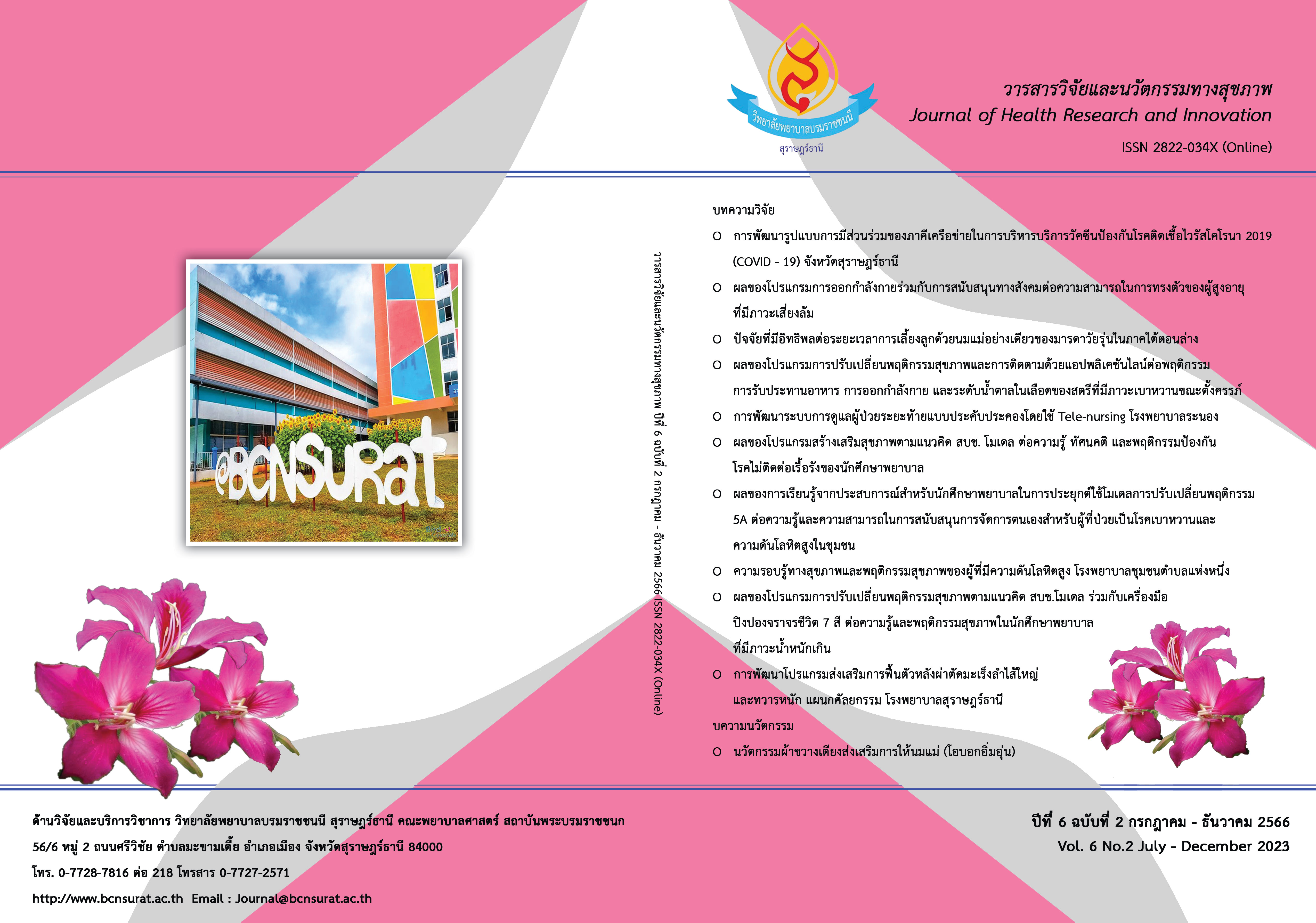การพัฒนาโปรแกรมส่งเสริมการฟื้นตัวหลังผ่าตัดมะเร็งลำไส้ใหญ่และทวารหนัก แผนกศัลยกรรม โรงพยาบาลสุราษฎร์ธานี
คำสำคัญ:
โปรแกรมส่งเสริมการฟื้นตัวหลังผ่าตัด, มะเร็งลำไส้ใหญ่และทวารหนัก, ภาวะแทรกซ้อน, วันนอนโรงพยาบาลบทคัดย่อ
การวิจัยและพัฒนานี้มีวัตถุประสงค์เพื่อพัฒนาโปรแกรมส่งเสริมการฟื้นตัวหลังผ่าตัดมะเร็งลำไส้ใหญ่และทวารหนัก แผนกศัลยกรรม โรงพยาบาลสุราษฎร์ธานี การวิจัยแบ่งเป็น 3 ระยะ คือ ระยะที่ 1 ศึกษาสภาพการณ์การดูแลผู้ป่วยที่ได้รับการผ่าตัดมะเร็งลำไส้ใหญ่และทวารหนัก โดยการทบทวนวรรณกรรม และสัมภาษณ์เชิงลึกทีมสหสาขาวิชาชีพ จำนวน 6 คน ระยะที่ 2 พัฒนาโปรแกรมส่งเสริมการฟื้นตัวหลังผ่าตัดมะเร็งลำไส้ใหญ่และทวารหนัก โดยการสนทนากลุ่มทีมพยาบาลวิชาชีพที่ดูแลผู้ป่วยจำนวน 10 คน ระยะที่ 3 ประเมินประสิทธิภาพของโปรแกรมส่งเสริมการฟื้นตัวหลังผ่าตัดมะเร็งลำไส้ใหญ่และทวารหนัก แผนกศัลยกรรม โรงพยาบาลสุราษฎร์ธานี โดยทีมพยาบาลวิชาชีพ 10 คน หลังทดลองใช้โปรแกรมกับผู้ป่วย 5 ราย และประเมินความเหมาะสมของโปรแกรม เครื่องมือที่ใช้ในการวิจัย ได้แก่ แนวคำถามหลักในการสัมภาษณ์เชิงลึกและการสนทนากลุ่มที่ผู้วิจัยสร้างขึ้น และประยุกต์ใช้แบบประเมินคุณภาพแนวปฏิบัติสำหรับการวิจัยและประเมินผล ซึ่งมีค่าดัชนีความตรงตามเนื้อหาเท่ากับ .88, .80 และ .88 ตามลำดับ คะแนนคุณภาพรวมของโปรแกรมเท่ากับ 6.37 และจากการนำโปรแกรมไปทดสอบกับกลุ่มที่คล้ายคลึงกับกลุ่มตัวอย่าง 10 คน ได้ค่า แอลฟา .95 วิเคราะห์ข้อมูลด้วยสถิติเชิงพรรณนา และการวิเคราะห์เนื้อหา
ผลการวิจัยระยะที่ 1 พบว่า การดูแลผู้ป่วยผ่าตัดมะเร็งลำไส้ใหญ่และทวารหนัก 4 ประเด็น คือ ไม่มีโปรแกรมส่งเสริมการฟื้นตัวหลังผ่าตัดที่ชัดเจน ปรึกษาอายุรกรรมและวิสัญญีเฉพาะผู้ป่วยที่มีโรคประจำตัว ปรึกษานักโภชนาการและนักกายภาพบำบัดเมื่อมีภาวะแทรกซ้อนหลังผ่าตัดเท่านั้น ระยะที่ 2 การพัฒนาโปรแกรมซึ่งประกอบด้วย กิจกรรมการพยาบาลก่อนรับไว้ในหอผู้ป่วย กิจกรรมการพยาบาลระยะก่อนและหลังผ่าตัด ระยะที่ 3ประเมินโดยทีมพยาบาลวิชาชีพ 10 คน จาก 5 หอผู้ป่วยในแผนกศัลยกรรมโดยใช้แบบประเมินคุณภาพแนวปฏิบัติสำหรับการวิจัยและประเมินผล พบว่าโปรแกรมมีความเหมาะสมต่อการนำไปใช้อยู่ในระดับดี(Mean=6.37, SD.=1.41) ซึ่งการให้ข้อมูลและการสาธิตที่ครบถ้วนตามโปรแกรมก่อนผ่าตัดจะส่งผลต่อประสิทธิภาพของโปรแกรมที่เพิ่มขึ้นด้วย
เอกสารอ้างอิง
Almeida, E. P. (2017). Early mobilization programme improves functional capacity after major abdomical cancer surgery:a randomized controlled trial. Britist Journal of Anaesthesia, 900-907.
Bhardwal, N. (2019). Enhanced recovery after surgery. Journal of Anaesthesiology Clinical Pharmacology, unpaged.
Boden, I.,Sullivan, K.,Hackett, C.,Winzer, B.,Lane, R.,McKinnon, M.,& Robertson, l. (2018). ICEAGE(Incidence of Complications following Emergency Abdominal Surgery:Get Exercising):study protocol of a pragmatic, multicentre, randomised controlled trial testing physiotherapy for the prevention of complication and improved physical recovery after emergency abdominal surgery. World Journal of Emergency Surgery,13(29), 1-17.
Calotta, N. A. (2018). Early Ambulation After Colorectal Oncologic Resection with Perineal Reconstruction is Safe and Effective. The American Journal of Surgery, 1-16.
Carmichaei, J. C. (2017, 60 8). Clinical Practice Guidelines for Enhanced Recovery After Colon and Rectal Surgery From the American Society of Colon and Rectal Surgeons and Society of American Gastrointestinal and Endoscopic Surgeons. Diseases of the Colon & Rectal Volume, 761-784.
Elgohary, H. B. (2017). Comparative study between enhanced recovery after surgery and conventional perioperative care in elective colorectal surgery. The Egyptian Journal of Surgery, 137-144.
Fagard, K. W. (2019). A Systematic review of the intervention components,adherence and outcome of enhanced recovery programmes in older patients undergoing elective colorectal surgery. BMC Geriatrics, 1-16.
Grass, F. P. (2018). Feasibility of early postoperative mobilisation after colorectal surgery : A retrospective cohort study. International Journal of Sugery (London,England), 161-166.
Greer, N. L. (2018). Enhanced recovery protocols for adults undergoing colorectal surgery : A Systematic review and Meta-analysis. Diseases of the Colon & Rectum, 1108-18.
Gustafsson, U. O. (2019). Guidelines for Perioperative Care in Elective Colorectal Surgery : Enhanced Recovery After Surgery (ERAS) Society Recommendations :2018. World Journal of Surgery, 659-695.
Holder-Murray, J. E. (2019). Postoperative nausea and vomiting in patients undergoing colorectal surgery within an institutional enhanced recovery after surgery protocol : comparison of two prophylactic antiemetic regimens. Korean Journal of Anesthesiology, 344-350.
Institute for Medical Technology Research and Evaluation, Department of Medical Services,Ministry of Public Health.(2013). Guideline quality assessment tool for research and evaluation. Retrieved from https://www.agreetrust.org/wp- content/uploads/ 2013/09/Thai-AGREE-II.pdf (In Thai)
Joris, J. L. (2018). How to implement an enhanced recovery programme after colorectal surgery? ACTA Chirurgica belgica , 1-5.
Lau, C. S. (2017). Enhanced Recovery After Surgery Programs Improve Patient Outcome and Recovery : A Meta - analysis. World Journal of Surgery, 899-913.
Lohsiriwat, V. (2019). Mosapride Reduces Prolonged Postoperative Ileus after Open Colorectal Surgery in the Setting of Enhanced Recovery after Surgery (ERAS) : A Matched Case-Control Study. Siriraj Medical Journal, 181-188.
Malczak, P.,Pisarska, M.,Piotr, M.,Wysocki, M.,Budzynski, A.,& Pedziwiatr, M. (2017). Enhanced Recovery after Bariatric Surgery: Systematic Review and Meta-Analysis, 226-235.
Medical records agency and cancer database Digital Medical Group National Cancer Institute. (2021). Hospital level cancer registry 2020.Retrieved April 23, 2023, from https://www.nci.go.th/e_book/hosbased_2563/files/main.pdf (In Thai)
Mercedes, C. O. (2019). Implementation of an Enhanced Recovery After Surgery program in elective colorectal surgery:a prospective cohort study. Journal Coloproctology, 249-257.
Office of the Health Promotion Foundation. (2021). Outstanding situation: Cancer is the leading cause of death one. Retrieved on April 23, 2023, from https://www.thaihealthreport.com/th/articles_detail.php?id=38 (In Thai)
Parinya, T., Arun, R., & Darin, L. (2016). Surgery evolves Colon and Rectal Surgery Edition (page 1-17). Bangkok: Bangkok Medical News. (In Thai)
Patil, S. C. (2019). Implementing enhanced recovery pathways to improve surgical outcomes. Journal of Anaesthesiology Clinical Pharmacology, unpaged.
Prapaporn, J., & Aunchalee, C. (2016). Factors predicting the number of hospital stays in elderly patients with gastrointestinal cancer treated with surgery. Journal of Cardiothoracic Nursing, 27(1), 30-42. (In Thai)
Siriphan ,P. (2016). The role of nurses in promoting early ambulation after surgery. Thai Red Cross Nursing Journal, 9(2),14-23. (In Thai)
Sutthajit, L.,Pornprom, M., & Pornchai,O. (2016). Surgery evolves in cancer.Bangkok: Bangkok Medical News. (In Thai)
Thamonwan, Y.,Nirobol, K., & Rungsima, T. (2018). Using clinical guidelines for caring for colorectal patients who undergo abdominal surgery. Journal of Thai Nursing and Midwifery Practice,5(1), 94-111. (In Thai)
Warut, L. (2016). Colorectal cancer. Retrieved on September 5, 2022, from https://mgronline.com/qol/detail/9590000025383 (In Thai)
Winai ,A. (2015). ERAS in cinical practice(Enchanced Recovery After Surgery. Royal College of Surgeons academic article. (In Thai)
ดาวน์โหลด
เผยแพร่แล้ว
รูปแบบการอ้างอิง
ฉบับ
ประเภทบทความ
สัญญาอนุญาต
ลิขสิทธิ์ (c) 2023 วิทยาลัยพยาบาลบรมราชชนนี สุราษฎร์ธานี

อนุญาตภายใต้เงื่อนไข Creative Commons Attribution-NonCommercial-NoDerivatives 4.0 International License.
บทความที่ได้รับการตีพิมพ์เป็นลิขสิทธิ์ของวารสารวิทยาลัยพยาบาลบรมราชชนนี สุราษฎร์ธานี
ข้อความที่ปรากฏในบทความแต่ละเรื่องในวารสารวิชาการนี้เป็นความคิดเห็นส่วนตัวของผู้เขียนแต่ละท่านไม่เกี่ยวข้องกับวิทยาลัยพยาบาลบรมราชชนนี สุราษฎร์ธานี และคณาจารย์ท่านอื่นๆในวิทยาลัยฯ แต่อย่างใด ความรับผิดชอบองค์ประกอบทั้งหมดของบทความแต่ละเรื่องเป็นของผู้เขียนแต่ละท่าน หากมีความผิดพลาดใดๆ ผู้เขียนแต่ละท่านจะรับผิดชอบบทความของตนเองแต่ผู้เดียว



